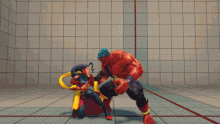
Rose Super Canceling her sequence
Super Canceling, often abbreviated as "SC", is a mechanic introduced in the Street Fighter III series, but has also been implemented into other fighting games as a mainstay mechanic ever since.
Description[]
Super Canceling is performed while attacking (usually during a special attack), by quickly inputting the character's Super Art/Super Combo during the attack animation.
Super Canceling makes it easier to string together higher-damage combos than simply performing the Super Art/Super Combo on its own. The damage done by the Super Art/Super Combo itself is lowered; this is due to the programming of Super Cancels in the Street Fighter III series, and damage scaling in the Street Fighter IV games.
The Street Fighter EX series expands upon the Super Cancel mechanic, allowing a Super Combo to be cancelled into a different Super Combo, as long as the player has enough meter.
In other kinds of fighting games, SC'ing during special attacks usually requires a form of extra cost for the super that's being cancelled into, or being in a specific state, as opposed to the usual criteria for when it's performed standalone or chained/cancelled into from a normal attack. Both other fighting games and the Street Fighter games alike make this a very character-dependent-based mechanic, as they are unique for each character and for each of their moves. Examples often include only certain projectiles being SC'able just as they come out or moves that are SC'able during certain frames upon connecting. There also exist moves that cannot be SC'able at all.
Several game series by SNK such as The King of Fighters (since 2001) and The Last Blade employ similar mechanics for Super Cancels, but are notably tight in timing, and also are limited to specific Super Moves or character state/modes.
Street Fighter 6 and its unique Super Art mechanics also affect Super Cancels. Level 1 Super Arts can only be cancelled from normal attacks and some Unique Attacks, Level 2 Super Arts can be cancelled from OD special attacks, and Level 3 Super Arts can be cancelled from meterless special attacks.
Crossover games[]
Super Cancels have evolved in crossover games such as Marvel vs. Capcom 2 and its two sequels, in the form of Delayed Hyper Combo, where team members can cancel a currently-performing Hyper Combo into another Hyper Combo from another member, up to three times. It is a staple game mechanic and is used either for extending combos, increasing damage output (especially in Marvel vs. Capcom 3 and its Ultimate upgrade, where Lv3 Hyper Combos deal unscaled damage), as a safety tactic for tagging in (since if a character does a Hyper Combo that misses and is left open for an attack), or even a trick/bait tactic by making the opponent drop their guard by mistake, only for the player to switch to another of his/her character's Hyper Combo that deals more damage and can hit anywhere (a notorious example of this is DHC from anyone's Lv1 Hyper Combo to an omni-hitting Lv3 Hyper Combo, such as Phoenix Wright's Ace Attorney Hyper Combo, or Magneto's Gravity Squeeze).
Likewise however, the standard special-to-super type of Super Cancel still exists in such games, though depending on the title and game in question, normal attacks (and/or short strings of normals) are still often the best way to cancel into supers.
